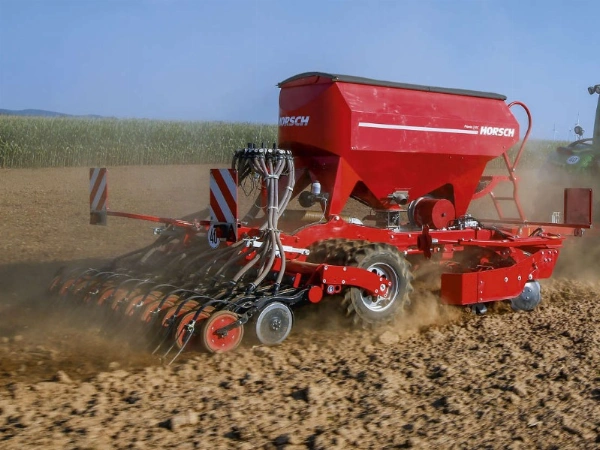In today's agricultural landscape, the pressure on farmers to achieve higher yields whilst maintaining sustainable practices has never been greater. With rising input costs and environmental concerns, seeding accuracy has become critical to farming success. Modern cereal drills equipped with precision seeding technology are revolutionising how we approach crop establishment, offering greater advantages over traditional methods. This blog explores both conventional seeding approaches and cutting-edge precision seeding technology, discussing how technological advancement is transforming agriculture for the better.
What are Cereal Drills?
Cereal drills are specialised agricultural machines designed to plant seeds into the soil at predetermined depths and spacing. Unlike traditional broadcasting methods, where seeds are scattered across the field surface, drills place seeds in precise rows or patterns, ensuring optimal seed-to-soil contact for germination. These machines work by creating furrows in the soil, placing seeds at the correct depth, and then covering them with soil to create the ideal growing conditions.
Cereal drills provide consistent seed placement, reduce seed waste, and create uniform growing conditions that lead to timely crop development. Whether you're growing wheat, barley, oats, or other cereals, the precision offered by modern drills is fundamental to achieving successful crop establishment and maximising potential yields from every hectare.
The Role of Modern Technology in Precision Seeding Using Cereal Drills
Today's cereal drills incorporate sophisticated technology that has transformed precision seeding from a concept into a practical reality. GPS guidance systems ensure accurate field coverage and prevent overlapping or missed areas, whilst variable-rate seeding technology adjusts seed density based on soil conditions and field characteristics. Advanced depth control mechanisms maintain consistent seeding depth across varying terrain, ensuring uniform germination and crop emergence.
Sensor technology also plays a crucial role in modern precision seeding, monitoring soil conditions, moisture levels, and seed placement in real-time. This technology allows drills to automatically adjust their operation based on changing field conditions, optimising seed placement accuracy throughout the entire seeding job. The result is a significantly improved seed placement accuracy, reduced input waste, and enhanced crop uniformity which leads to better yields and improved profits for farmers.
Benefits of Precision Seeding for Farmers
Precision seeding delivers clear, tangible benefits that directly impact farm profitability and sustainability. Improved yields are perhaps the most significant advantage, with precise seed placement leading to more uniform crop stands and better resource utilisation. Cost savings on seed and fertiliser are equally important, as precision application reduces waste and ensures every seed has the best chance of establishing successfully.
Time efficiency is another benefit, with modern drills covering more ground effectively whilst requiring less manual intervention. Environmental advantages include reduced over-seeding, minimised soil compaction, and more efficient use of inputs, supporting sustainable farming practices. Precision seeding proves particularly beneficial for farmers managing variable soil conditions, and for farmers seeking to optimise input costs, operators working in challenging weather, and farms looking to improve their environmental credentials whilst maintaining profitability.
Comparing Traditional vs Precision Methods
Traditional methods and precision seeding approaches differ significantly in their operation and outcomes. Traditional methods typically require less initial investment and are simpler to operate, but they often result in uneven seed distribution, higher seed rates, and less predictable germination.
Precision methods require more sophisticated equipment and operator training, but they deliver better crop results through consistent seed placement and optimal growing conditions. Maintenance requirements are higher due to the use of more advanced machinery, but this is offset by reduced input costs and improved yields. Long-term soil health benefits from precision seeding include reduced compaction from multiple passes and due to more targeted fertiliser application.
It's important to note that precision seed drilling varies by crop type. For crops like maize, sugar beet, and sunflower, precision seed drilling involves single-seed placement at exact spacing intervals. However, for cereals, legumes, and grasses, modern drills enable precision seeding through advanced technologies that optimise seed distribution patterns rather than individual seed placement.
The Future of Precision Planting
Agricultural machinery continues evolving rapidly to help farmers achieve high-quality yields more efficiently than ever before. AI-driven decision support systems are beginning to guide seeding density, depth, and timing using real-time soil and weather data, taking precision to unprecedented levels. These systems analyse multiple variables simultaneously to make optimal planting decisions that would be impossible for human operators to calculate manually.
Big data integration combines planting data with yield maps, soil analysis, and satellite imagery to improve strategy each growing season, creating a continuous improvement cycle that benefits long-term farm productivity.
Smart sensors and IoT-enabled drills provide live monitoring of seed placement and soil health, making automatic adjustments during planting operations. This technology ensures optimal conditions are maintained throughout the seeding process, regardless of changing field conditions. The focus on sustainability and efficiency continues driving innovation, helping farmers reduce inputs, protect soil health, and meet rising food demand with fewer resources.
Why Farmers Should Consider Modern Cereal Drills
- Modern cereal drills deliver proven results that directly impact your bottom line. The evidence is clear:
- Immediate gains: Improved crop establishment, reduced input costs, and higher yields from day one
- Operational efficiency: Adaptability to varying field conditions whilst maintaining consistent performance
- Environmental benefits: Reduced seed waste, targeted fertiliser application, and better soil health
- Future-proofing: Investment in technology that continues delivering value for years to come
For farmers seeking to enhance current performance whilst building sustainable operations, modern cereal drills offer the perfect balance of immediate returns and long-term advantages.
Find Your Next Precision Seeding Drill with AMTEC
The AMTEC team understands that every farming operation has unique requirements, and we're here to help you find the perfect cereal drill to match your needs and budget. Whether you're looking for the latest technology or seeking excellent value from quality used farm machinery, our extensive range of drills and seeders offers solutions for operations of all sizes. Our range of drills covers from precision to direct, cultivation and combination drill types. Reach out to the AMTEC team today to discuss your requirements or browse our comprehensive selection of farm machinery to discover the precision seeding solutions that could revolutionise your farming operation.








